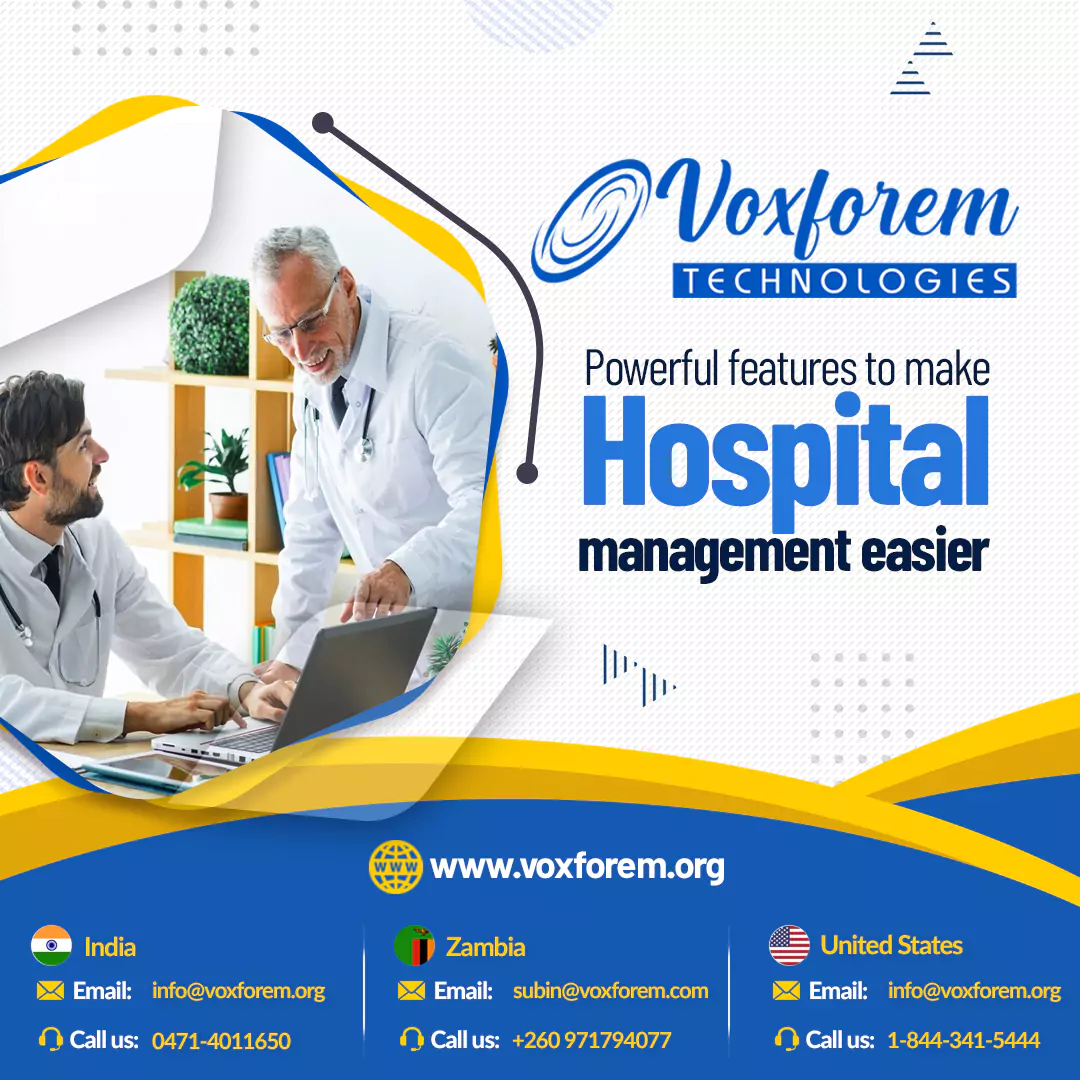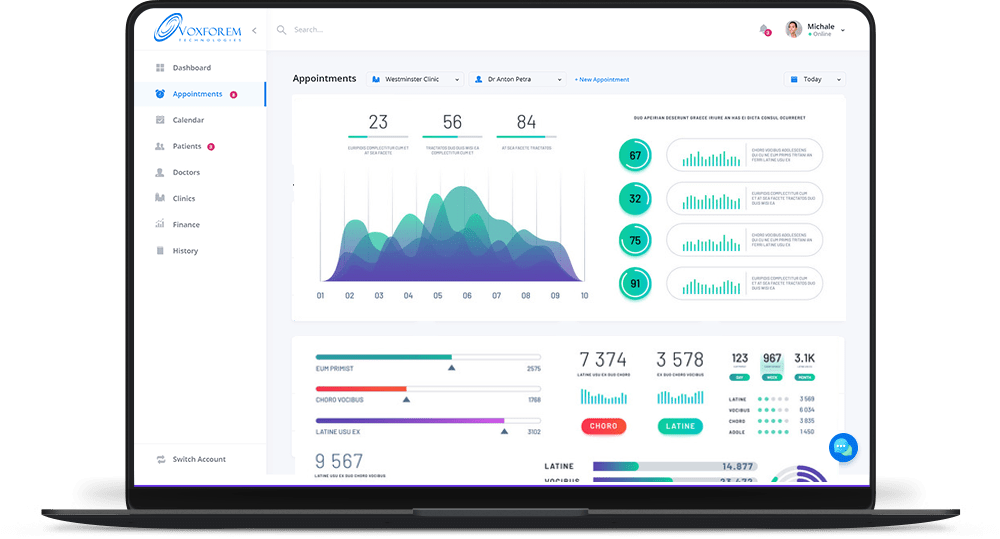
The Core Features and Benefits of Hospital Management Systems
Once, visiting a hospital was an ordeal at times, such as the long waiting queue for a doctor’s appointment, at the medicine counter, or for Lab tests.
Modern technology and recent inventions, which are are transforming physical appointments into digital ones. Additionally, mobile apps make hospital management more convenient and comfortable by taking away all of the hassle associated with everyday activities.
Hospital management software is causing a big boom in the field of Health. It digitizes the record-keeping process, cuts costs as patient management is streamlined, facilitates communication by sending messages regarding medicines, enhances workforce optimization, and reduces overhead expenses. It also opens up opportunities for remote patient services. These developments in turn improve doctors’ efficiency, lower mistakes, and upgrade patient care.
When considering a high-quality tech solution for hospital management, it is critical to thoroughly identify and analyze the essential features required to create an optimal software system. A comprehensive examination and incorporation of a wide range of useful features will lead to the development of a highly optimized system that aligns with the specific needs and requirements of the hospital management environment.
Patient Management System
Patient management software (PMS) is a means to handle administrative matters and store patient vital data. Patient management is much more than scheduling an appointment, assessing the patient, treating them, and discharging them from the hospital. Healthcare providers also need to have personal communication with patients to provide care and have excellent patient experience. Moreover, patients can book appointments anytime and anywhere, eliminating the need for the reception desk and creating a solid foundation for patient interaction.
Managing patients can be very time-consuming, but patient management software can do all the necessary tasks so doctors can spend more time with their patients instead of handling paperwork.
Lab Management System
The essential feature to include in laboratory management for hospital software is the ability to update patient data and send messages in communication channels to clinic staff and patients. This can often impact the speed of getting an accurate receipt and the overall outcome of treatment.
The primary goal of Hospital Laboratory Management is to streamline manual tasks by enabling lab technicians to directly report lab test results to doctors, which can then be accessed by the doctor from anywhere, at any time.
Inventory Management System
Hospital inventory management software plays an important role in boosting inventory management and operation. It helps ensure the constant availability of inventory items, drugs, and other medical materials.
Furthermore, it estimates the delivery date, notifies when items need restocking, and creates reminders for ordering certain groups of inventory. Additionally, today's hospital management software lets you track the expiration dates of medicines so you can determine if sufficient supplies are being replenished.
Pharmacy Management System
This system encompasses robust stock management, seamless prescription integration, handling of ward requests, monitoring of stock movement, and the generation of intelligent reports. Implementation of this system enables pharmacies to optimize their processes, ensuring precise stock levels, seamless prescription management, and access to insightful reports for informed decision-making.
Data Management and Reporting
Hospital Management System offers comprehensive tools for collecting, organizing, and managing patient data, as well as generating detailed reports. Hospital Management system functional capabilities enable the generation of comprehensive reports on patients and doctors, medical staff performance, hospital budget and patient billing, monthly inventory usage, and more. Accessing this data in a few clicks facilitates real-time analysis to develop a successful hospital management model and devise a cost-effective strategy for further development. This functionality assists healthcare facilities in maintaining accurate and up-to-date records, facilitating informed decision-making, and optimizing patient care.
The vital role of hospital management software and apps is revolutionizing the healthcare ecosystem
An effective hospital management system (HMS) has the potential to transform the way hospitals run and benefit both healthcare providers and patients at the same time
Paperless Record Management
Hospitals are handling large amounts of data every day which can be challenging to manage manually. Digital transformation services can help by implementing Hospital Management Software to track patient records and medical history, improving efficiency for doctors.
Efficient Patient Management
Patients can benefit from the use of healthcare mobile apps and hospital management systems by reducing their wait times and inconveniences in the hospital. Automation and customized app solutions can streamline hospital processes and patient experiences, providing easy access to information and action without manual visits to multiple counters.
Implementing Workforce Strengthening
Hospitals often face patient rushes, leading to understaffing and shortages of medicine and doctors. To address this, hospital management mobile apps or software can help efficiently track staff, delegate tasks, and manage financial processes.
Making Communication and Consultation Easier
By using mobile apps, hospitals can easily share information between departments, enabling quicker collaboration and better emergency decisions.
Efficiently oversee financial operations and accounting processes.
Hospitals deal with numerous financial transactions and keeping track of them all can be challenging. Hospital management mobile apps offer a convenient solution for handling funds, ensuring data security, and generating financial statements for departments, employees, and services.
Inventory Management
The hospital must keep track of various items, such as medical instruments, equipment, medicines, etc. Smart inventory management systems can be integrated into hospital apps to automatically manage stock levels and other information.
Remote Patient Services
Hospital management software can treat patients in distant places, providing medical facilities to remote patients at home. Some hospitals offer medical assistance to underprivileged people through mobile apps.
Reduce Diagnostic Mistakes
In the medical field, minute details and numerical figures are crucial, and even a hint of an error can lead to complications. The use of an automated system will eliminate human error and speed up the sharing of information. Therefore, hospital management software is very handy in dealing with such instant issues.
Reduces Management Costs
Since the hospital processes are automated, it reduces the need for additional manpower, saving on costs and resources.
Easily Connect with Wearables to Gather Data
The HMS can be connected with wearable devices to track patients' health and share real-time data with doctors. The integrated software is effective for remotely monitoring patients and updating prescriptions based on their symptoms.
In conclusion, Hospital Management Systems have revolutionized the healthcare industry by addressing the complex needs of modern hospitals. These systems streamline operations, enhance patient care, and improve the overall hospital experience. With user-friendly interfaces, robust data handling capabilities, and a commitment to data security, HMS ensures that healthcare institutions can focus on what truly matters – the well-being of their patients







